Trial

Brief Synopsis
Cast & Crew
Mark Robson
Glenn Ford
Dorothy Mcguire
Arthur Kennedy
John Hodiak
Katy Jurado
Film Details
Technical Specs

Synopsis
After being informed that his lack of trial experience threatens his chances of achieving tenure, State University law professor David Blake decides to spend his summer vacation interning for a local attorney. In the nearby resort town of San Juno, California, David is unsuccessful until he happens into the small law office of Barney Castle. Barney enthusiastically offers to pay David's expenses in exchange for assistance on his biggest case to date, the pro bono defense of Angel Chavez, a Mexican-American teenager accused of murdering Marie Wiltse, a local white girl. Marie's body was discovered the evening before on San Juno's private beach after beachgoers heard her screams. Nearby, police found a trembling and frightened Angel and immediately hauled him off to jail. Angel admits that he trespassed onto the beach and ran into Marie, an acquaintance from school. According to Angel, he and Marie kissed, but Marie suddenly became frightened of getting caught and bolted. Noting that Marie suffered from a serious heart condition, Barney declares the state's case weak and refuses to accept District Attorney John Armstrong's offer of a plea bargain.
Meanwhile, the simmering racial tension between San Juno's white and Mexican-American communities threatens to explode, leading Barney and David to visit the dead girl's grieving parents to request that they hold a small, private funeral. Mrs. Wiltse agrees to their request, but the following day, two of the town's most outspoken racists, Ralph Castillo and Cap Grant, show up at Marie's funeral and incite the crowd with calls for vengeance and racial segregation. Transformed into a lynch mob, the crowd heads over to the town jail to demand that Angel be handed over. Barney and David, aware that the jailer, A. A. "Fats" Sanders, is sympathetic to the mob, rush to the jail to demand Angel's protection. Eventually, Sanders convinces the assembled townspeople to disperse by promising them a "legal hanging." David begins preparing for the upcoming trial, working after hours at Barney's beach house with Abbe Nyle, Barney's attractive secretary. Meanwhile, in order to raise funds for Angel's defense, Barney travels to New York City with Consuela Chavez, Angel's mother. Judge Theodore Motley, a black man, is assigned to preside over the case, arousing David's suspicion that the choice of judge has been influenced by the powerful town bigots in an attempt to give the trial the appearance of fairness. When David cautiously approaches Judge Motley with his concerns, the judge, greatly insulted, accuses David of racism. Jury selection begins, after which Barney summons David to New York in order to make a speech at a fundraising rally for Angel. David suspects that Barney's New York colleagues are Communists and confronts Barney with his suspicions. In response, Barney cynically proclaims that he does not care whether the money he raises for Angel is "clean, American money." At the Madison Square Garden rally, David reluctantly delivers the short speech Barney has prepared for him, but when he attempts to speak out against Communism, he is drowned out by a large, brass band.
Back in California, a disillusioned David is furious with Abbe for not warning him about Barney's political leanings and, to make matters worse, his presence at the New York rally catches the attention of the zealous Senator Battle, chairman of the State Un-American Activities Committee. David soon confronts Abbe, with whom he was beginning to fall in love, with his suspicion that both she and Barney are Communist Party members. Abbe admits that Barney is a Communist, and confesses that she was a "fellow traveler" in her idealistic college days, but insists that she no longer supports the Party. David accepts Abbe's tearful apology and their romantic involvement deepens. With jury selection completed, Angel's trial begins. In his opening statement, Armstrong asks for the death penalty, declaring that Marie died in the act of defending herself from a sexual assault by Angel. David decides against calling defense witnesses, preferring instead to raise doubts about the prosecution's case, a strategy which proves successful as he rigorously cross-examines first Marie's cardiologist and then an eyewitness. Barney returns from New York and, over David's objections, inexplicably insists that Angel take the stand. Soon realizing that Barney plans to sabotage any chance of Angel's acquittal in order to make the boy a martyr for the Communist cause, Abbe advises David to resign from the case, but David refuses to abandon Angel. On the stand, Angel is convincing under David's gentle questioning, but begins to falter when Armstrong catches him in a number of lies, most notably concerning the extent of his sexual education. The jury returns a guilty verdict and David begins preparing an appeal, but Barney promptly fires him. Later, David and Abbe visit Mrs. Chavez hoping to convince her to dismiss Barney from the case, but Barney has successfully manipulated her into believing that the sacrifice of her son will benefit the fight for racial equality. The next morning, as Angel's sentencing commences, David bursts into the courtroom and demands to be heard as a "friend of the court." After Barney's attempts to silence him fail, David makes an impassioned speech revealing Barney's plan to engineer Angel's execution in order to drum up support for the Communist Party. The judge believes David, as do the prosecutor and assembled townspeople, who greatly fear becoming pawns in a Communist plot. Judge Motley sentences Angel to a short term in reform school, causing Barney to denounce him as an "Uncle Tom." Barney's outburst earns him a thirty-day sentence for contempt, while David learns that Sen. Battle's committee is no longer investigating him. A relieved David and Abbe leave the now empty courtroom arm in arm, as a pensive Judge Motley looks on.

Director
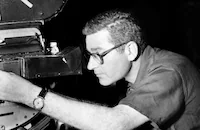
Mark Robson
Cast
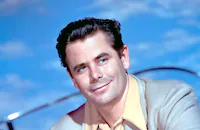
Glenn Ford

Dorothy Mcguire
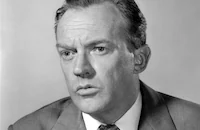
Arthur Kennedy

John Hodiak

Katy Jurado
Rafael Campos

Juano Hernandez

Robert Middleton

John Hoyt
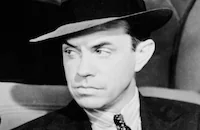
Paul Guilfoyle

Elisha Cook
Ann Lee

Whit Bissell
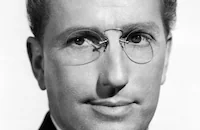
Richard Gaines
Barry Kelley
Frank Cady
Charles Tannen
David Leonard
John Rosser

James Todd
Sheb Wooley
Charlotte Lawrence
Percy Helton
Dorothy Green
Everett Glass
Grandon Rhodes
Charles Evans
Frank Wilcox
Robert Forrest
John Mckee
Anthony Merrill
Wilson Wood
Robert Bice
John Maxwell
Michael Dugan
Bob Stratton
Eddie Baker
Vince Townsend
Gloria Moore
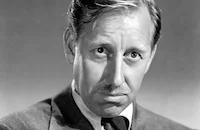
Frank Ferguson
Mort Mills
Heinie Brock
Leonard Freeman
Joe Locke
Robert Haines
Joe Mcguinn
Richard [dickie] Tyler
Mitchell Lewis
Jean Wong
Don Orlando
Joe Flynn
Natalie Masters
Rodney Bell
Lois Kimbrell
Hal K. Dawson
Isabel Campo
J. Peter Lloyd
Crew
Albert Akst
Daniele Amfitheatrof
Randall Duell
Cedric Gibbons
Sydney Guilaroff
Fred Maclean
Don M. Mankiewicz
Wesley C. Miller
James E. Newcom
Warren Newcombe
Al Rothman
Robert Saunders
Charles Schnee
Robert Surtees
William Tuttle
Wallace A. Wallace
Edwin B. Willis

Videos
Movie Clip





Film Details
Technical Specs

Award Nominations
Best Supporting Actor
Articles
Trial
McCarthy's deserved humiliation and defeat on live TV may not have ended the blacklist; however, it set the tone for a lengthy healing process that would eventually span more than two decades to vindicate many of the political victims. It seemed apt that Metro would take on a project encompassing a number of controversial topics, and Trial (1955), based on the best-selling novel by Don Mankiewicz (who also penned the taut script), zeroed in on every falsehood perpetrated by the dreaded HUAC moniker.
In its 105-minute running time, the movie, about a Mexican youth's murder accusation and the crash exploitation behind it, managed to cover racial prejudice, witch hunting, the crooked judicial system and the deterioration of our education program. In fact, if the forces responsible for Trial were guilty of anything, it was, as a few critics pointed out, for attempting to cover too much at once. Nevertheless these aforementioned forces were formidable ones and, along with the excellent screenplay, the picture boasted a superb stellar cast led by Glenn Ford, who, with Blackboard Jungle (released the same year), shot from a popular leading man at Columbia Pictures to MGM superstar.
Supporting Ford were Dorothy McGuire, Arthur Kennedy, John Hodiak and Katy Jurado - all of whom (not coincidentally) had various liberal political ties. Ford's young Blackboard co-star Rafael Campos was re-united with the actor as the confused human pawn (appropriately named Angel). This select group was rounded out by a veritable character actor heaven, including Elisha Cook, Jr., Whit Bissell, Robert Middleton and John Hoyt. Particularly memorable is the great Juano Hernandez, portraying cinema's first African American judge. The Puerto Rican born actor is probably best known for his role as the lynching victim in Intruder in the Dust (1949), based on the William Faulkner novel.
For director Mark Robson, Trial would be nothing short of a crowning achievement. Having co-edited Citizen Kane (1941), then helming the Val Lewton RKO horror classics, Seventh Victim (1943) and Bedlam (1946), Robson had become "A-list" material with his handling of the 1949 Kirk Douglas smash Champion. Although today remembered for his lush big budget soaps like Peyton Place (1957) and the campy Valley of the Dolls (1967), Trial is generally considered to be his best work. And here's a last bit of trivia: Sheb Wooley, cast in the supporting role of Butteridge, once had a number one pop hit on the charts for six weeks in 1958 - "Purple People Eater."
Producer: Charles Schnee
Director: Mark Robson
Screenplay: Don M. Mankiewicz
Art Direction: Randall Duell, Cedric Gibbons
Cinematography: Robert Surtees
Film Editing: Albert Akst
Original Music: Daniele Amfitheatrof
Cast: Glenn Ford (David Blake), Dorothy McGuire (Abbe Nyle), Arthur Kennedy (Barney Castle), John Hodiak (John J. Armstrong), Katy Jurado (Consuela Chavez), Rafael Campos (Angel Chavez), Juano Hernandez (Judge Motley), Robert Middleton (A.A. 'Fats' Sanders), John Hoyt (Ralph Castillo), Elisha Cook, Jr. (Finn).
BW-110m. Letterboxed. Closed captioning.
by Mel Neuhaus

Trial
TCM Remembers - Katy Jurado
KATY JURADO, 1924 - 2002
Katy Jurado, an Oscar nominee and major actress in Westerns, died July 5th at the age of 78. She was born in Guadalajara, Mexico on January 16th 1924 as Maria Cristina Estella Marcela Jurado Garcia, daughter of a cattle rancher and an opera singer. Jurado started to appear in Mexican films in 1943. After 15 films in her native country, director Budd Boetticher saw Jurado attending a bullfight (Jurado wrote about the subject for Mexican newspapers) and cast her in his Bullfighter and the Lady (1952), her Hollywood debut. For much of her career Jurado alternated between the two film industries. In the US, she was memorable for the sensual energy she brought to roles in High Noon (1952), One-Eyed Jacks (1961) which was directed by Marlon Brando, Sam Peckinpah's Pat Garrett and Billy the Kid (1973) and John Huston's Under the Volcano (1984). She was nominated for an Oscar as Best Supporting Actress for Broken Lance (1954). Jurado's Mexican films were in a broader range of genres and included Luis Bunuel's El Bruto (1952), Ismael Rodriguez's We the Poor and Miguel Littin's The Widow Montiel (1979). She won three Ariel Awards (Mexican equivalent to the Oscars) and one special award. She was married to Ernest Borgnine from the end of 1959 to summer 1963. One of her final films was The Hi-Lo Country (1998), a contemporary Western directed by Stephen Frears and co-starring Woody Harrelson, Billy Crudup and Penelope Cruz.
by Lang Thompson
DOLORES GRAY, 1924 - 2002
Broadway and nightclub star Dolores Gray died June 26th at the age of 78. Her movie career was brief but consisted of high-profile MGM musicals which guaranteed her a place in film history. Gray was born in Chicago on June 7th, 1924 (and where, according to a common story, she was accidentally shot by a gangster as a child and had a bullet in her lung her entire life). As a teenager she began singing in California until Rudy Vallee featured her on his radio show. Gray moved to Broadway in 1944 and then to the London stage in 1947, solidifying her reputation as a singer/actress while constantly giving the gossip columnists plenty to write about. She had two small singing roles in Lady for a Night (1941) and Mr. Skeffington (1944) but didn't really light up the big screen until It's Always Fair Weather (1955) even though Gray reportedly didn't much care for the role. Her rendition of "Thanks a Lot, But No Thanks," which has her gunning down a slew of male dancers on-stage and kicking them through trap doors, is a genuine showstopper. Three more unforgettable musical roles quickly followed: Kismet (1955), The Opposite Sex (1956, which Gray turned down Funny Face to do) and Designing Women (1957). That was it for Gray's film career. She kept busy with TV appearances (mostly singing though she did one 1988 episode of the cult show Dr. Who) and a busy recording and nightclub schedule. In 1987, she appeared in a British production of Follies at Stephen Sondheim's request.
by Lang Thompson
ROD STEIGER, 1925 - 2002
From the docks of New York to the rural back roads of Mississippi to the war torn Russian steppes, Rod Steiger reveled in creating some of the most overpowering and difficult men on the screen. He could be a total scoundrel, embodying Machiavelli's idiom that "it's better to be feared than loved" in the movies. But as an actor he refused to be typecast and his wide range included characters who were secretly tormented (The Pawnbroker, 1965) or loners (Run of the Arrow, 1965) or eccentrics (The Loved One, 1965).
Along with Marlon Brando, Steiger helped bring the 'Method School' from the Group Theater and Actors Studio in New York to the screens of Hollywood. The Method technique, taught by Stella Adler and Lee Strasberg, insisted on complete immersion into the character's psyche and resulted in intense, dramatic performances and performers. Steiger made his first significant screen appearance as Brando's older brother in On the Waterfront (1954). Their climatic scene together in a taxicab is one of the great moments in American cinema.
It was a short leap from playing a crooked lawyer in On the Waterfront to playing the shady boxing promoter in The Harder They Fall (1956). Based on the tragic tale of true-life fighter Primo Carnera, The Harder They Fall details the corruption behind the scenes of professional boxing bouts. Steiger is a fight manager named Nick Benko who enlists newspaperman Eddie Willis (Humphrey Bogart in his final screen appearance) to drum up publicity for a fixed prizefight. While the boxing scenes were often brutally realistic, the most powerful dramatic moments took place between Steiger and Bogart on the sidelines.
As mob boss Al Capone (1959), Steiger got to play another man you loved to hate. He vividly depicted the criminal from his swaggering early days to his pathetic demise from syphilis. In Doctor Zhivago (1965), Steiger was the only American in the international cast, playing the hateful and perverse Komarovsky. During the production of Dr. Zhivago, Steiger often found himself at odds with director David Lean. Schooled in the British tradition, Lean valued the integrity of the script and demanded that actors remain faithful to the script. Steiger, on the other hand, relied on improvisation and spontaneity. When kissing the lovely Lara (played by Julie Christie), Steiger jammed his tongue into Christie's mouth to produce the desired reaction - disgust. It worked! While it might not have been Lean's approach, it brought a grittier edge to the prestige production and made Komarovsky is a detestable but truly memorable figure.
Steiger dared audiences to dislike him. As the smalltown southern Sheriff Gillespie in In The Heat of the Night (1967), Steiger embodied all the prejudices and suspicions of a racist. When a black northern lawyer, played by Sidney Poitier, arrives on the crime scene, Gillespie is forced to recognize his fellow man as an equal despite skin color. Here, Steiger's character started as a bigot and developed into a better man. He finally claimed a Best Actor Academy Award for his performance as Sheriff Gillespie.
Steiger was an actor's actor. A chameleon who didn't think twice about diving into challenging roles that others would shy away from. In the Private Screenings interview he did with host Robert Osborne he admitted that Paul Muni was one of his idols because of his total immersion into his roles. Steiger said, "I believe actors are supposed to create different human beings." And Steiger showed us a rich and diverse cross section of them.
by Jeremy Geltzer & Jeff Stafford
TCM Remembers - Katy Jurado
Quotes
Trivia
Notes
Opening credits note that Don Mankiewicz's screenplay was adapted from his "Harper's Prize Novel." According to the Hollywood Reporter review and a NYMirror-News news item, the prestigious award, given to Mankiewicz in 1954 for his unpublished manuscript of Trial, carried with it $10,000 and guaranteed publication of the novel by Harper's Publishing. Mankiewicz was subsequently paid $25,000 for screen rights and hired to write the film adaptation of his work. The Hollywood Reporter review indicates that Mankiewicz gave the screenplay a happier ending and developed the love story in more detail than in the novel. According to studio publicity material, Grosset and Dunlap published a special edition of Trial to tie-in with the release of the film. The film's closing credits provide character names for the principal players superimposed over scenes from the film featuring the respective actors.
According to news items in NYMirror-News and in New York Times, the New York City rally scene was shot at the Shrine Auditorium in Los Angeles. Filmed over three days at a cost of $110,000, the scene used 2,000 extras, 750 of whom were students from the nearby University of Southern California. Correspondence dated March 1955 and contained in the file on the film in the MPAA/PCA Collection at the AMPAS library indicates that M-G-M executives were concerned that the script might appear as a "subtly Communist vehicle" given the negative comments made by the protagonist about the fictitious Senator's zealous pursuit of Communists and the sympathy accorded his love interest, a former Party member. However, correspondence to studio executives from PCA officials makes no mention of any suggestion of pro-Communist sentiment and the above plot elements remain in the filmed version. The PCA office was highly critical of the script's intimation that David and Abbe spend the night together and of oblique references to Abbe's prior affair with her boss, both of which remain in the film.
Trial received generally laudatory reviews and was praised for its historical significance and depiction of race relations. The Hollywood Reporter review declared not only that "every American should see it," but also "every European" since this film would "prove...that Americans, in their approach to history, are not stupid, not children, and not naïve." The feature article in Life magazine emphasized the timeliness of the film by noting that at a Harlem rally protesting the acquittal of two white men accused of murdering fourteen-year-old Emmett Till for whistling at a white woman, one African-American speaker warned the crowd not to accept any help from the Communist Party because "their support is the kiss of death." The Daily Variety review proclaimed the film's depiction of Judge Motley a notable advance in the representation of black characters, adding that if the Birth of a Nation "was the Negro race's greatest misfortune," Trial May be its "greatest break in terms of a fully felt, many-sided, warm human being." Arthur Kennedy received an Academy Award nomination in the Best Supporting Actor category for his portrayal of "Barney Castle."

Miscellaneous Notes
Released in United States 1995
Released in United States Fall October 1955
Released in United States 1995 (Shown at AFI/Los Angeles International Film Festival (The AFI Fest Movie Marathon-All Night: Left Wing versus Right Wing) October 19 - November 2, 1995.)
Released in United States Fall October 1955













